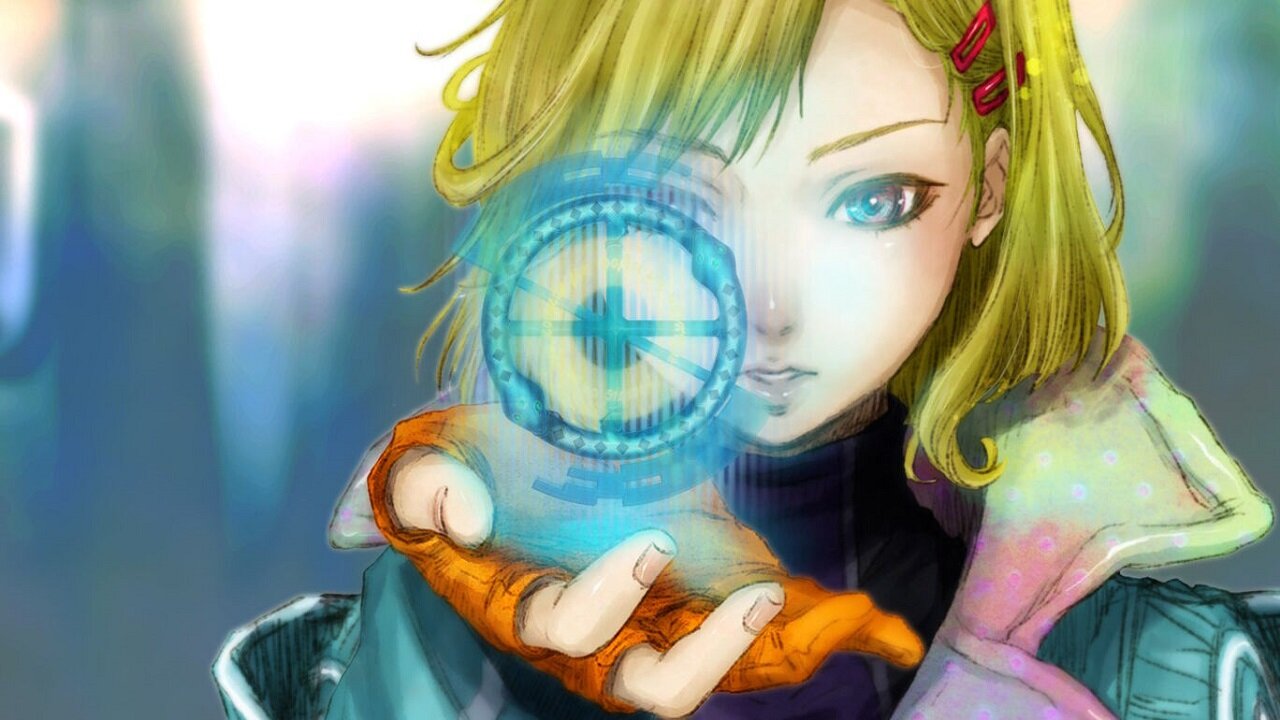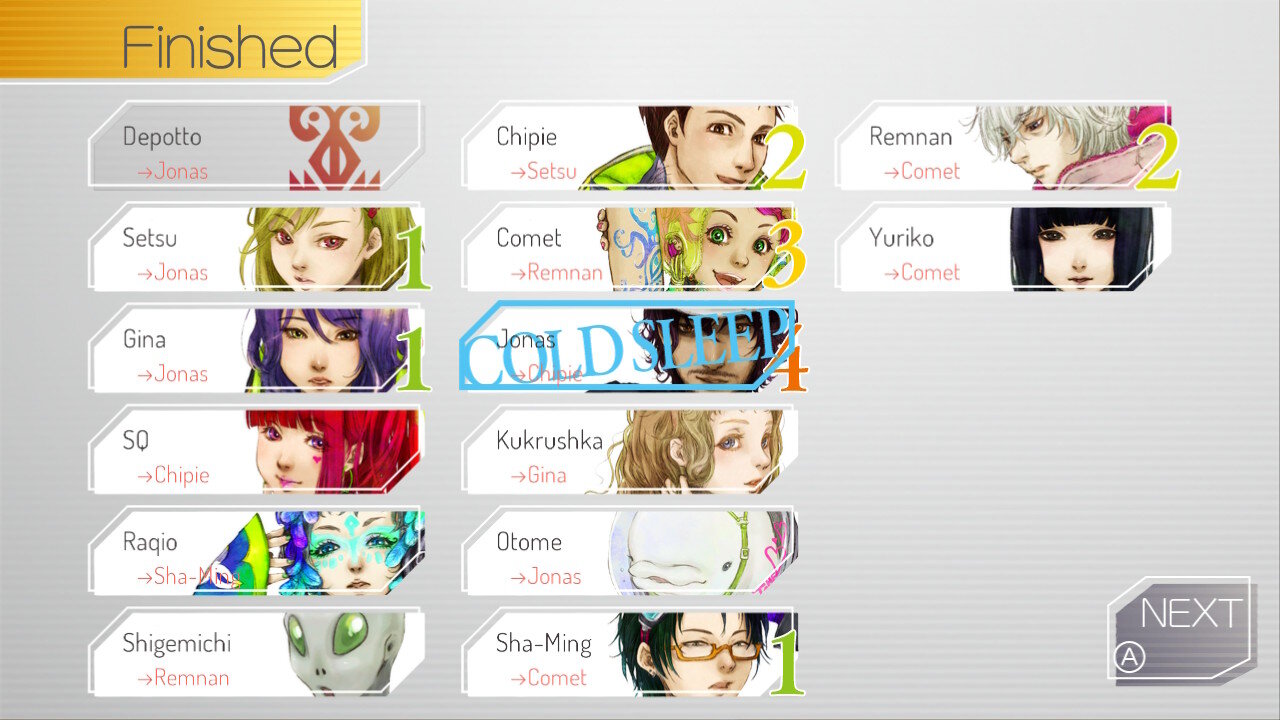Review | Gnosia
Chances are that if you’re at all already familiar with Gnosia, then you probably know it as that game that’s basically Among Us except with an anime aesthetic. And while that’s not an entirely inaccurate description, it doesn’t do the game justice in the slightest.
Set aboard a drifting spaceship, you and your fellow crew members learn that somebody onboard has been infected by the titular Gnosia. What the Gnosia actually are is a complete mystery, but their goal is clear: the complete eradication of all human life. The goal of the crew is to correctly identify the infected and put them into cold sleep, while the Gnosia must avoid detection and pick the crew members off one by one until they can take over the ship.
You’re telling me this game is hella anime? With art like this? NO!
Despite the Among Us comparisons, Gnosia is more like the classic party game Werewolf (something it actively acknowledged in its launch trailer), but the key difference is that Gnosia has no multiplayer aspects whatsoever. It’s entirely single-player, which you wouldn’t think would work for a social deduction game where the fun primarily comes from the arguments, distrust, and deception between players. So what has the team at Petit Depotto done to create a compelling experience?
Gnosia makes up for the complete absence of multiplayer with a heavy emphasis on story. As it turns out, the entire crew is trapped in some sort of time loop, which resets regardless of whether the humans or Gnosia succeed. You and one other crew members, Setsu, are the only ones aware of the loop so it’s up to you to find out what’s causing it, break the cycle, and save everybody on board.
We use special house rules when we play Gnosia.
At the start of each loop, you are asked to select its parameters of the scenario - the ‘rules’ of the game, you could say. Namely, how many crew members there are (you can have up to 15, including yourself), how many Gnosia are hiding among them, whether specific roles are present, and your own role.
Each loop consists of multiple rounds where the crew comes together and holds a debate about who can and can’t be trusted. After a few rounds of discussion, everyone votes and whoever receives the most votes is put into cold sleep. If a round ends and Gnosia are still present, then the Gnosia target one of the crew members and presumably kill them without even leaving a body behind; a crew member just disappears.
The process continues until either all the Gnosia are in cold sleep or if the number of Gnosia is equal to or more than the remaining crew. How you approach each loop depends on your own role, be you human or Gnosia. Yes, sometimes you will need to be Gnosia yourself to solve the mystery of the time loop.
Debate me with facts and uwu.
The actions available to you during the debates are initially incredibly limited and you’ll more than likely struggle to win loops during the early stages of the game. You may not be up against human players, but your fellow crew members aren’t easily swayed morons and brain-dead idiots.
Gnosia boasts some incredibly intuitive AI; repeatedly throw out accusations or stay too quiet and the other crew members will pick up on that and grow suspicious of you. If you’re Gnosia, someone tries to vote for you, and you take them out, the next round will begin with you as suspect number one.
What’s more, each crew member has their own distinct playstyle and mannerisms and picking up and recognising patterns is key, especially when you’re trying to work out who can be trusted and who is Gnosia.
But if we’re being honest, the real roadblock is that everyone else’s stats are simply better than yours. Yes, Gnosia also boasts RPG elements. Every loop, whether you win or lose, earns you experience (obviously, winning loops nets you more than losing them) and levelling up allows you to increase your different stats: Charisma, Charm, Intuition, Logic, Performance, and Stealth.
Each stat affects the overall gameplay in multiple ways. A high Stealth stat, for example, makes you less likely to be targeted during the debates but also decreases the odds that the Gnosia will take you out in between rounds. Depending on which stats you focus on improving, your debate strategy can vary greatly, but it’s advised you tend to all of them since unlocked skills require certain stats to be high enough to use.
The skills themselves can be acquired during the downtime between debates, where you can hang out with the other crew members in a manner somewhat similar to the Confidants in Persona 5. But while these skills are incredibly useful and can turn debates in your favour, the other crew members can use them too.
Look at this loveable cast of… IS THAT A DOLPHIN?
This can make later loops a hell of a lot more challenging, especially if multiple optional roles are in the mix. The Engineer, for instance, can analyse one crew member per round to determine if they’re Gnosia or not, but Gnosia can falsely claim this role and trusting the wrong one can doom you.
Sometimes, there can be an AC Follower, a human player actively aiding the Gnosia, and there’s even a third-party role called the Bug, whose goal is to simply make it to the end of the loop so they can destroy the universe through their mere existence.
All of this can be incredibly overwhelming but, thankfully, the first several loops act as tutorials for how the overall structure and each individual role works. Plus, you have access to a gigantic menu of tutorials and tips right from the start and there are also character bios for each of the different crew members that highlight their own stats and provide some insight into their own strategies.
But winning loops, while ideal, isn’t always how you progress the story. Your real goal is to collect information on the other crew members and fill out the Notes section of their character bios by triggering specific story sequences.
The specifics needed to trigger them are never fully explained but don’t worry about needing to fall back on a guide to avoid pointlessly playing through dozens of loops. A lot of them tend to occur naturally and the game even recommends that you try and be as friendly as possible with any crew members you’re missing info on by covering for them and agreeing with them in the debates. Plus, there’s an Event Search option that automatically sets up loops where story sequences can potentially take place.
I’ve only seen this screenshot but I already hate this guy more that the mysterious alien threat picking of the crew one by one.
It took us roughly 160 loops to reach the true ending and not one of them ever felt like a waste of time. After all, you’re always making some progress by gaining experience and the loops themselves are relatively short, sometimes lasting only 10 minutes. This means Gnosia has that fantastic “one more go” quality that can eat up several hours of your time.
And since no two loops ever play out quite the same way, it never gets boring or predictable. People you trusted in one loop could be your enemies in the next and even your constant companion Setsu can’t always be relied on since you can end up on opposing sides (don’t take it personally).
The cast is delightfully varied in terms of visual design and personality, the latter of which shines through despite the lack of voice acting and limited animation. All the characters feel like perfect fits for this sort of game and you will fall in love with at least one of them, whether it’s the arrogant Raqio, the timid Remnan, or the literal space whale Otome.
Yep… Definitely a dolphin. That rocks.
Petit Depotto deserves a great deal of recognition for successfully making one of the most enjoyable and intriguing games we’ve had the fortune to play in years. It’s already a game of the year contender and it’s frankly a miracle that it was able to escape from being a Japanese only PlayStation Vita game and make some sort of impact in the West. With any luck, it will receive a PC port too down the line.
It’s unlikely Gnosia will ever be as half as popular as Among Us, but if you have any sort of fondness for social deduction games or time-travel stories, we implore you to check it out yourself. And with any luck, Petit Depotto will be able to make more games like this gem.












